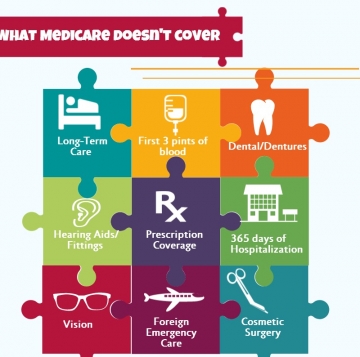While Medicare (Part A and B) cover a wide array of health care services after you turn 65, it doesn’t cover everything. If you need or want certain services that aren’t covered, you’ll have to pay for them yourself unless you have other insurance, or you enroll in a Medicare Advantage health plan, which may offer some additional benefits. Here’s a look at some commonly needed medical services that original Medicare doesn’t pay for.
Most dental care: Routine dental care including checkups, cleanings, fillings, tooth extractions and dentures are not covered by Medicare. However, some Medicare Advantage plans do cover basic dental care services.

Routine vision care and eyeglasses: Medicare does not cover routine eye exams, eyeglasses and contact lenses (except following cataract surgery), but tests, treatments and surgeries for medical eye diseases like cataracts, glaucoma and macular degeneration are covered. Some Medicare Advantage plans do offer routine vision benefits.
Alternative medicine: Acupuncture, chiropractic services (except to fix subluxation of the spine), and other types of alternative or complementary care are not covered by Medicare.
Prescription drugs: Medicare (Part A and B) doesn’t provide coverage for outpatient prescription drugs, but you can buy a separate Part D prescription-drug policy that does, or a Medicare Advantage plan that covers both medical and drug costs.
Cosmetic surgery: Most cosmetic procedures are not covered, however, if the surgery is due to an injury or deformity, it might pay. For example, Medicare will cover a breast prosthesis for breast cancer survivors.
Hearing aids: Medicare will not pay for hearing exams or hearing aids, but may cover a hearing and balance exam if your doctor determines it’s necessary. Some Medicare Advantage plans do offer hearing benefits.
Long-term care: Nursing home care and assisted living facilities are not covered by Medicare. But, Medicare will help pay up to 100 days of skilled nursing or rehabilitation care immediately following a hospital stay of three or more days.
Personal home care: If you need to hire help for bathing, dressing or getting out of bed, Medicare typically won’t cover these costs either, unless you are homebound and are also receiving skilled nursing care. Housekeeping services, such as shopping, meal preparation and cleaning are not covered either unless you are receiving hospice care. But a few Medicare Advantage plans do offer in-home support services.
Routine foot care: Medicare does not cover most routine foot care, like the cutting or removing of corns, calluses and toenails. But they do cover medically necessary podiatrist services for foot problems like hammertoes, bunion and heel spurs, along with exams, treatments and therapeutic shoes or inserts if you have diabetic foot problems.
Overseas coverage: In most cases, health care outside of the United States is not covered by Medicare except for very limited circumstances – such as on a cruise ship within six hours of a U.S. port. But, Medigap supplemental plans D, G, M and N cover 80 percent of emergency care abroad, and some Medicare Advantage plans cover emergency care abroad too.
The best way to find out what Medicare covers is to talk to your health care provider, visit Medicare.gov/coverage and type in your test, item or service, or download the Medicare “What’s covered” app on the App Store or Google Play. And to look for Medicare Advantage plans that offer additional benefits visit Medicare.gov/plan-compare.
Also keep in mind that even if Medicare covers a service or item, they don’t pay 100 percent of the cost. You will have to pay a monthly Part B premium (which is $135.50 for most beneficiaries) and unless you have supplemental insurance, you’ll have to pay your annual deductibles and copayments too. However, most preventive services are covered 100 percent by Medicare with no copays or deductibles.
Jim Miller publishes the Savvy Senior, a nationally syndicated column that offers advice for Boomers and Seniors.
Related Articles & Free Subscription

Helping Seniors Extend Their Driving Years
Monitoring Solutions for Loved Ones with Dementia
What Are the 2020 Income Tax Filing Requirements for Retirees?






Comment here